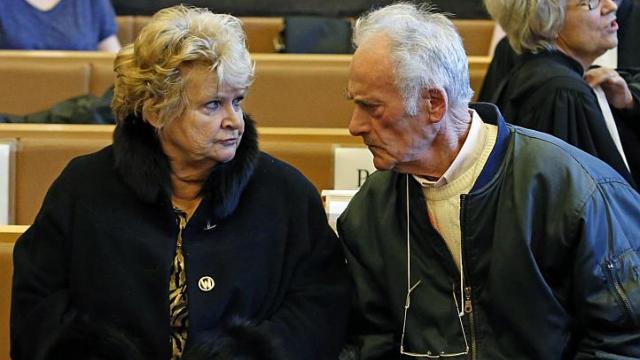But some of the artist's heirs, including his son Claude, suspect otherwise and filed a complaint against the couple, who were charged in 2011.
And in a significant twist to the trial on Tuesday, Claude Picasso's lawyer accused Le Guennec of being the "front" for a "case of international artwork laundering."
- 'Total confidence in me' -
"Picasso had total confidence in me. Maybe it was my discretion," Le Guennec told the court in the southeastern city of Grasse at the start of a three-day trial which is likely to be closely scrutinised by the art world.
"Monsieur and Madame called me 'little cousin'."
The former electrician said that one day, Picasso's wife Jacqueline gave him a box with the 271 works of art inside.
"She told me 'this is for you'," he said.
When he got home, he looked inside and found "drawings, sketches, crumpled paper," adding he and his wife Danielle did not look through everything.
Asked by the judge whether he wasn't a little curious, he responded: "no."
"I didn't have in mind that they were works of art, they were essays, torn bits, it didn't grab me.
"It's not as if I saw a painting, it's not the same, it's not the same reaction."
He put the present in his garage and discovered it again years later, in 2009.
But when he went to Paris the following year to get the works authenticated at the Picasso Administration, the artist's heirs filed an official complaint.
Claude Picasso, who runs the administration, is one of the plaintiffs in the case.
Others include Paloma, Claude's sister, another child Maya, two grandchildren and Catherine Hutin-Blay, the daughter of Picasso's last wife Jacqueline.
"I never could see how anyone could swallow that," Maya Widmaier-Picasso said of the defence's argument.
"It's like going to the bakery for a baguette and he gives you 271!" she told the court.
Picasso granddaughter Catherine Hutin-Blay, the only one of the plaintiffs to have known Le Guennec, admitted that the electrician had a privileged relationship with the artist.
"We really trusted him. He was someone who was very familiar in the house and had an absolutely friendly relationship," she said.
"However, all this absolutely extraordinary collection, Picasso would never have given that," she added.
- Global artwork laundering? -
Under the charge of possessing stolen goods, the lawyers do not have to demonstrate who the alleged thief was but do have to prove that the couple knew the works of art came from a fraudulent origin.
And in a twist to the case, Jean-Jacques Neuer, Claude Picasso's lawyer, accused Le Guennec of being the cover for "a case of international artwork laundering."
"These stolen works were given to him because he had had ties with Picasso," he said.
Le Guennec had said earlier Tuesday that he made a list of the artworks before presenting it to the Picasso Administration in 2010, with the help of his brother-in-law who had a gallery.
But Neuer accused him of never having made any such lists, which he said were too detailed for someone who knew little about art.
In one example cited by the lawyer, the former electrician said that a small pencil drawing had similarities with a 1915 painting of a harlequin exhibited at the Museum of Modern Art in New York.
Neuer had also pointed out before the trial that none of the works in Le Guennec's possession were signed, an unusual occurrence for Picasso who always autographed his work -- whether he gave it away or sold it.
The couple's lawyer Charles-Etienne Gudin, however, has said there were only a dozen works of value and that the rest was "very mediocre," insisting that Picasso never tried to sell them.
He added that it would have been extremely difficult for anyone to steal from Picasso, as the artist had "an amazing memory" and his property was heavily protected like a "fortress."
-------------------------------------------------------------------------------------------------------------------------------
And in a significant twist to the trial on Tuesday, Claude Picasso's lawyer accused Le Guennec of being the "front" for a "case of international artwork laundering."
- 'Total confidence in me' -
"Picasso had total confidence in me. Maybe it was my discretion," Le Guennec told the court in the southeastern city of Grasse at the start of a three-day trial which is likely to be closely scrutinised by the art world.
"Monsieur and Madame called me 'little cousin'."
The former electrician said that one day, Picasso's wife Jacqueline gave him a box with the 271 works of art inside.
"She told me 'this is for you'," he said.
When he got home, he looked inside and found "drawings, sketches, crumpled paper," adding he and his wife Danielle did not look through everything.
Asked by the judge whether he wasn't a little curious, he responded: "no."
"I didn't have in mind that they were works of art, they were essays, torn bits, it didn't grab me.
"It's not as if I saw a painting, it's not the same, it's not the same reaction."
He put the present in his garage and discovered it again years later, in 2009.
But when he went to Paris the following year to get the works authenticated at the Picasso Administration, the artist's heirs filed an official complaint.
Claude Picasso, who runs the administration, is one of the plaintiffs in the case.
Others include Paloma, Claude's sister, another child Maya, two grandchildren and Catherine Hutin-Blay, the daughter of Picasso's last wife Jacqueline.
"I never could see how anyone could swallow that," Maya Widmaier-Picasso said of the defence's argument.
"It's like going to the bakery for a baguette and he gives you 271!" she told the court.
Picasso granddaughter Catherine Hutin-Blay, the only one of the plaintiffs to have known Le Guennec, admitted that the electrician had a privileged relationship with the artist.
"We really trusted him. He was someone who was very familiar in the house and had an absolutely friendly relationship," she said.
"However, all this absolutely extraordinary collection, Picasso would never have given that," she added.
- Global artwork laundering? -
Under the charge of possessing stolen goods, the lawyers do not have to demonstrate who the alleged thief was but do have to prove that the couple knew the works of art came from a fraudulent origin.
And in a twist to the case, Jean-Jacques Neuer, Claude Picasso's lawyer, accused Le Guennec of being the cover for "a case of international artwork laundering."
"These stolen works were given to him because he had had ties with Picasso," he said.
Le Guennec had said earlier Tuesday that he made a list of the artworks before presenting it to the Picasso Administration in 2010, with the help of his brother-in-law who had a gallery.
But Neuer accused him of never having made any such lists, which he said were too detailed for someone who knew little about art.
In one example cited by the lawyer, the former electrician said that a small pencil drawing had similarities with a 1915 painting of a harlequin exhibited at the Museum of Modern Art in New York.
Neuer had also pointed out before the trial that none of the works in Le Guennec's possession were signed, an unusual occurrence for Picasso who always autographed his work -- whether he gave it away or sold it.
The couple's lawyer Charles-Etienne Gudin, however, has said there were only a dozen works of value and that the rest was "very mediocre," insisting that Picasso never tried to sell them.
He added that it would have been extremely difficult for anyone to steal from Picasso, as the artist had "an amazing memory" and his property was heavily protected like a "fortress."
-------------------------------------------------------------------------------------------------------------------------------









 Home
Home Politics
Politics











